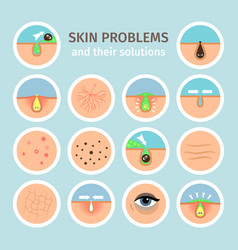Amidst The Misconceptions About Acne, Find The Surprising Truths That Might Change Your Skin Care Regular For Life. What Actually Triggers Your Breakouts?
Amidst The Misconceptions About Acne, Find The Surprising Truths That Might Change Your Skin Care Regular For Life. What Actually Triggers Your Breakouts?
Blog Article
Author-Webb Kjeldsen
You may assume that delighting in delicious chocolate or oily foods is the origin of your acne, however that's just among lots of myths swirling around this typical skin condition. In fact, acne mainly stems from stopped up hair follicles, not your last treat. Misconceptions like these can lead you to take on ineffective skin care practices that may also worsen your scenario. As you navigate the truths behind acne, you'll uncover understandings that might transform your method to skincare and assist you attain more clear skin. So, what really lies underneath the surface?
Common Myths About Acne
When it involves acne, lots of people rely on typical myths that can lead to complication and stress. One common misconception is that eating chocolate or oily foods triggers acne. While diet can influence skin health, the direct link in between specific foods and acne isn't as well-defined as lots of believe.
One more common mistaken belief is that you must scrub your face intensely to clear up outbreaks. In reality, aggressive scrubbing can aggravate your skin and worsen acne.
https://www.verywellhealth.com/dimple-surgery-dimpleplasty-5090432 might likewise think that acne just impacts teens, but adults can experience it too, commonly due to hormonal modifications or tension. Some individuals believe that tanning can clean up acne, however sun exposure can in fact cause skin damage and get worse outbreaks in the future.
Finally, many believe that making use of extreme products will eliminate acne rapidly. However, these items can remove your skin of its all-natural oils, leading to enhanced irritability and more breakouts.
Scientific Facts Behind Acne
Understanding the scientific facts behind acne can equip you to tackle this common skin condition better.
Acne occurs when hair follicles come to be blocked with oil, dead skin cells, and bacteria. This procedure usually starts with an overproduction of sebum, the oil your skin normally generates. Hormone modifications, especially throughout adolescence or menstruation, can cause this excess oil.
Microorganisms called Propionibacterium acnes thrive in these blocked pores, causing inflammation. When your immune system responds, it can trigger inflammation and swelling, resulting in those bothersome acnes or cysts.
Genes additionally contribute; if your moms and dads had acne, you may be more susceptible to it.
Diet plan and anxiety levels can affect acne too, yet study is still progressing in these areas. While delighting in oily foods won't directly cause outbreaks, a balanced diet can sustain your skin health.
Similarly, managing tension can lower hormone fluctuations that might get worse acne.
Tips for Managing Acne
Handling acne efficiently calls for a mix of daily skin care practices and way of life modifications. Beginning by establishing a regular skincare regimen. Clean your face two times a day with a gentle, non-comedogenic cleanser to remove dust and excess oil. Avoid scrubbing too hard, as this can irritate your skin and worsen acne.
Next off, incorporate products including salicylic acid or benzoyl peroxide to assist avoid outbreaks. Constantly follow up with a light-weight, oil-free moisturizer to keep your skin hydrated. Do not fail to remember botox before after for non-comedogenic alternatives to secure your skin from UV damages without obstructing pores.
Beyond skin care, take notice of your diet regimen. Restriction sweet and oily foods, and concentrate on fruits, veggies, and whole grains. Staying hydrated is important, so beverage a lot of water throughout the day.
Furthermore, handle anxiety via tasks like yoga, meditation, or workout, as stress and anxiety can cause breakouts.
Last but not least, prevent selecting or standing out acnes. This can lead to scarring and further swelling. If your acne continues, get in touch with a dermatologist for individualized therapy alternatives.
Conclusion
Finally, it's important to separate truth from fiction when it involves acne. By debunking common misconceptions, you can much better understand your skin and make educated selections for your skin care routine. So, why continue to count on out-of-date ideas when the fact can encourage you? Accept healthier behaviors, focus on gentle cleansing, and remember that handling acne is a journey. With the best knowledge, you're one action closer to clearer, much healthier skin.
